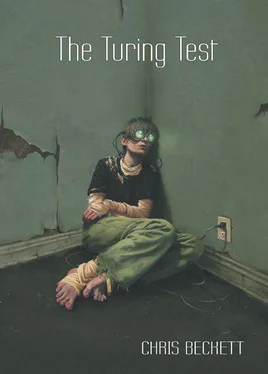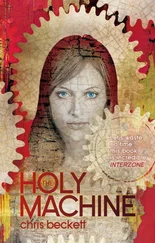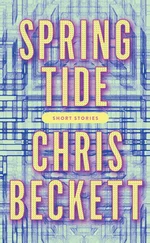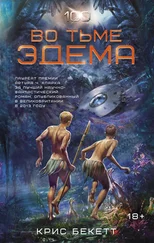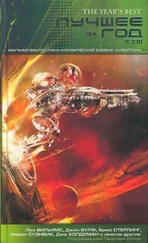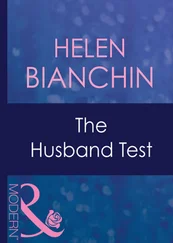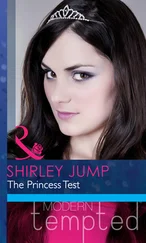Крис Бекетт - The Turing Test
Здесь есть возможность читать онлайн «Крис Бекетт - The Turing Test» весь текст электронной книги совершенно бесплатно (целиком полную версию без сокращений). В некоторых случаях можно слушать аудио, скачать через торрент в формате fb2 и присутствует краткое содержание. Город: Norwich, Год выпуска: 2008, ISBN: 2008, Издательство: Elastic Press, Жанр: Фантастика и фэнтези, на английском языке. Описание произведения, (предисловие) а так же отзывы посетителей доступны на портале библиотеки ЛибКат.
- Название:The Turing Test
- Автор:
- Издательство:Elastic Press
- Жанр:
- Год:2008
- Город:Norwich
- ISBN:978-0-9553181-8-4
- Рейтинг книги:4 / 5. Голосов: 1
-
Избранное:Добавить в избранное
- Отзывы:
-
Ваша оценка:
- 80
- 1
- 2
- 3
- 4
- 5
The Turing Test: краткое содержание, описание и аннотация
Предлагаем к чтению аннотацию, описание, краткое содержание или предисловие (зависит от того, что написал сам автор книги «The Turing Test»). Если вы не нашли необходимую информацию о книге — напишите в комментариях, мы постараемся отыскать её.
Literary Awards: Edge Hill Short Story Prize (2009).
The Turing Test — читать онлайн бесплатно полную книгу (весь текст) целиком
Ниже представлен текст книги, разбитый по страницам. Система сохранения места последней прочитанной страницы, позволяет с удобством читать онлайн бесплатно книгу «The Turing Test», без необходимости каждый раз заново искать на чём Вы остановились. Поставьте закладку, и сможете в любой момент перейти на страницу, на которой закончили чтение.
Интервал:
Закладка:
Chris Beckett
THE TURING TEST
STORIES
For my friends
Acknowledgements
Special thanks to David Pringle and Lee Montgomerie, formerly of Interzone, whose rejection letters 18 years ago were so detailed that they were almost a correspondence course and so encouraging that I kept on sending stories in. And to Gardner Dozois, Sheila Williams, Andy Cox, Jetse De Vries and not least Andrew Hook. The people who edit and publish magazines and anthologies, frequently for minimal reward, are the ones who make it possible for people like me to think of ourselves as writers. Which means a huge amount to us. For some strange reason.
The Turing Test
I can well remember the day I first encountered Ellie because it was a particularly awful one. I run a London gallery specialising in contemporary art, which means of course that I deal largely in human body parts, and it was the day we conceded a court case – and a very large sum of money – in connection with a piece entitled ‘Soul Sister’.
You may have heard about it. We’d taken the piece from the up and coming ‘wild man of British art’, George Linderman. It was very well reviewed and we looked like making a good sale until it came out that George had obtained its main component – the severed head of an old woman – by bribing a technician at a medical school. Someone had recognised the head in the papers and, claiming to be related to its former owner, had demanded that it be returned to them for burial.
All this had blown up some weeks previously. Seb, the gallery owner, and I had put out a statement saying that we didn’t defend George’s act, but that the piece itself was now a recognised work of art in the public domain and that we could not in conscience return it. We hired a top QC to fight our corner in court and he made an impressive start by demanding to know whether Michelangelo’s David should be broken up if it turned out that the marble it had been made from was stolen and that its rightful owner preferred it to be made into cement.
But that Thursday morning the whole thing descended into farce when it emerged that the head’s relatives were also related to the QC’s wife. He decided to drop the case. Seb decided to pull the plug and we lost a couple of hundred grand in an out of court settlement to avoid a compensation claim for mental distress. Plus, of course we lost ‘Soul Sister’ itself to be interred in some cemetery somewhere, soon to be forgotten by all who had claimed to be so upset about it. What was it all, after all, once removed from the context of a gallery, but a half kilo of plasticised meat?
That wasn’t the end of it either. I’d hardly got back from court when I got a call from one of our most important clients, the PR tycoon, Addison Parves. I’d sold him four ‘Limb Pieces’ by Rudy Slakoff for £15,000 each two weeks previously and they’d started to go off. The smell was intolerable, he said, and he wanted it fixed or his money back.
So I phoned Rudy (he is arguably Linderman’s principal rival for the British wild man title) and asked him to either re-pickle the arms and legs in question or replace them. He was as usual aggressive and rude and told me (a) to fuck off, (b) that I was exactly the kind of bourgeois dilettante that he most hated – and (c) that he had quite deliberately made the limb pieces so that they would be subject to decay.
“…I’m sick of this whole gallery thing – yeah, yours included Jessica – where people can happily look at shit and blood and dead meat and stuff, because it’s all safely distanced from them and sanitised behind glass or on nice little pedestals. Death smells , Jessica. Parves’d better get used to it. You ’d better get used to it. I finished with Limb Pieces when Parves bought the fuckers. I’m not getting involved in this. Period.”
He hung up leaving me fuming, partly because what he said was such obvious crap – and partly because I knew it was sort of true.
Also, of course, I was upset because, having lost a fortune already that day, we stood to lose a further £60,000 and/or the good will of our second biggest client. Seb had been nice about the Soul Sister business – though I’d certainly been foolish to take it on trust from Linderman that the head had been legally obtained – but this was beginning to look like carelessness.
I considered phoning Parves back and trying to persuade him that Rudy’s position was interesting and amusing and something he could live with. I decided against it. Parves hated being made to look a fool and would very quickly become menacing, I sensed, if he didn’t get his own way. So, steeling myself, I called Rudy instead and told him I’d give him an extra £10,000 if he’d take Limb Pieces back, preserve the flesh properly, and return them to Parves.
“I thought you’d never ask!” he laughed, selling out at once and yet maddeningly somehow still retaining the moral high ground, his very absence of scruple making me feel tame and prissy and middle-class.
I phoned Parves and told him the whole story. He was immensely amused.
“Now there is a real artist, Jessica,” he told me. “A real artist.”
He did not offer to contribute to the £10,000.
Nor was my grim day over even then. My gallery is in a subscriber area so, although there’s a lot of street life around it – wine bars, pavement cafes and so on – everyone there has been security vetted and you feel safe. I live in a subscriber area too, but I have to drive across an open district to get home, which means I keep the car doors locked and check who’s lurking around when I stop at a red light. There’s been a spate of phoney squeegee merchants lately who smash your windows with crowbars and then drag you out to rob you or rape you at knifepoint. No one ever gets out of their car to help.
That evening a whole section of road was closed off and the police had set up a diversion. (I gather some terrorists had been identified somewhere in there and the army was storming their house.) So I ended up sitting in a long tailback waiting to filter onto a road that was already full to capacity with its own regular traffic, anxiously eyeing the shadowy pedestrians out there under the street lights as I crawled towards the intersection. I hate being stationary in an open district. I hate the sense of menace. It was November, a wet November day. Every cheap little shop was an island of yellow electric light within which I got glimpses of strangers – people whose lives mine would never touch – conducting their strange transactions.
What would they make of ‘Soul Sisters’ and ‘Limb Pieces’, I wondered? Did these people have any conception of art at all?
A pedestrian stopped and turned towards me. I saw his tattooed face and his sunken eyes and my heart sank. But he was only crossing the road. As he squeezed between my car and the car in front he looked in at me, cowering down in my seat, and grinned toothlessly.
It was 7.30 by the time I got back, but Jeffrey still wasn’t home. I put myself through a quick shower and then retired gratefully to my study for the nourishment of my screen.
My screen was my secret. It was what I loved best in all the world. Never mind art. Never mind Jeffrey. (Did I love him at all, really? Did he love me? Or had we simply both agreed to pretend?). My screen was intelligent and responsive and full of surprises, like good company. And yet unlike people it made no demands of me, it required no consideration and it was incapable of being disappointed or let down.
It was expensive, needless to say. I rationalised the cost by saying to myself that I needed to be able to look at full-size 3D images for my work. And it’s true that it was useful for that. With my screen I could look at pieces from all around the world, seeing them full-size and from every angle; I could sit at home and tour a virtual copy of my gallery, trying out different arrangements of dried-blood sculptures and skinless torsos; I could even look at the gallery itself in real time, via the security cameras. Sometimes I sneaked a look at the exhibits as they were when no one was there to see them: the legs, the arms, the heads, waiting, motionless in that silent, empty space.
Читать дальшеИнтервал:
Закладка:
Похожие книги на «The Turing Test»
Представляем Вашему вниманию похожие книги на «The Turing Test» списком для выбора. Мы отобрали схожую по названию и смыслу литературу в надежде предоставить читателям больше вариантов отыскать новые, интересные, ещё непрочитанные произведения.
Обсуждение, отзывы о книге «The Turing Test» и просто собственные мнения читателей. Оставьте ваши комментарии, напишите, что Вы думаете о произведении, его смысле или главных героях. Укажите что конкретно понравилось, а что нет, и почему Вы так считаете.
